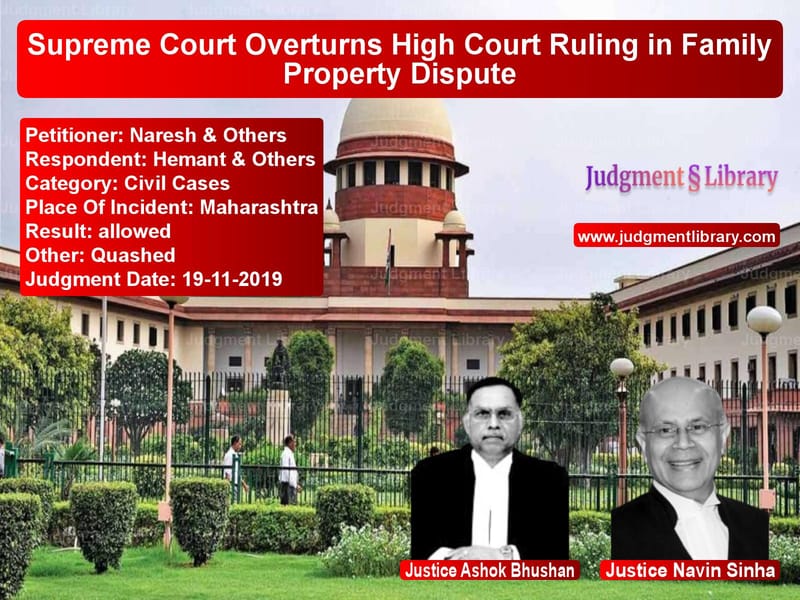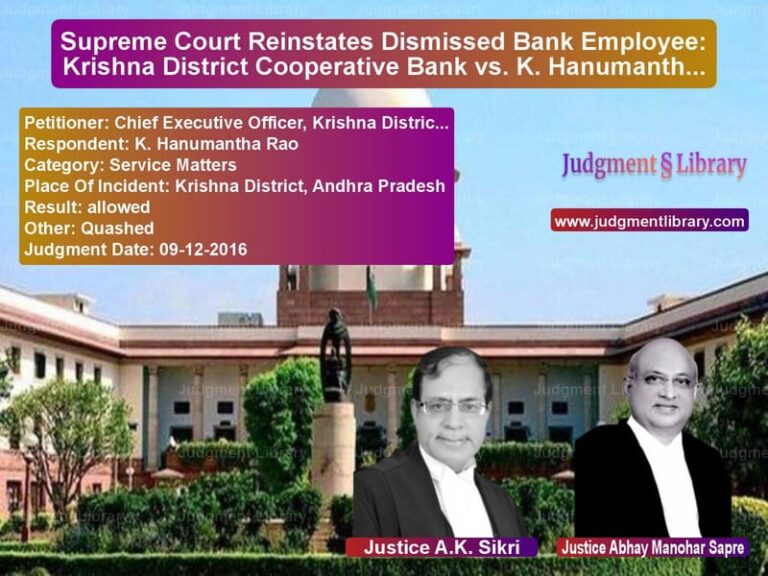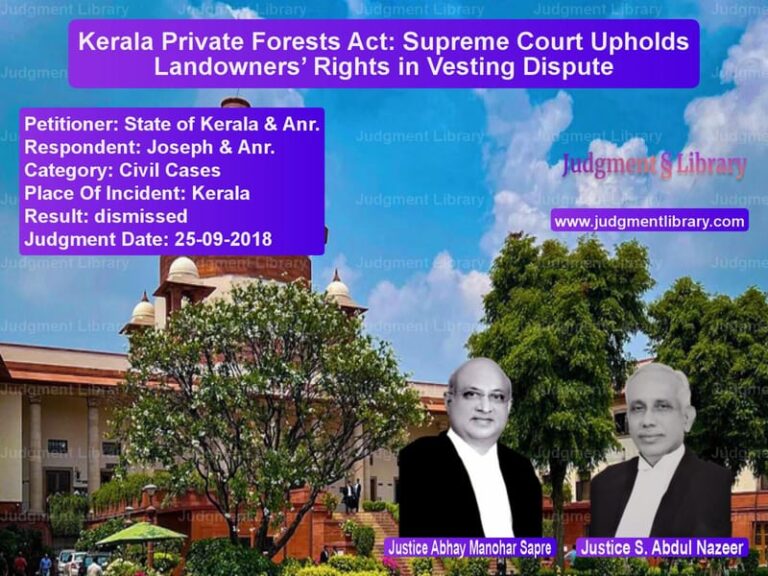Supreme Court Overturns High Court Ruling in Family Property Dispute
The Supreme Court of India, in the case of Naresh & Others vs. Hemant & Others, addressed a long-standing property dispute between two families. The case revolved around the ownership of a property purchased in the name of two brothers, Ramchandrarao Ingole and Trimbakrao Ingole. The Court had to decide whether the property was jointly owned or solely belonged to one of the brothers.
The case had gone through multiple judicial levels. The trial court and first appellate court had ruled in favor of the defendants, holding that the plaintiffs failed to establish joint ownership. However, the High Court overturned these decisions, favoring the plaintiffs. The Supreme Court ultimately restored the findings of the trial court and first appellate court, ruling against the High Court’s intervention.
Background of the Case
The dispute concerns a 7011 sq. ft. property with a house, initially purchased in 1957. The plaintiffs, legal heirs of Ramchandrarao Ingole, filed a suit in 1995, seeking partition and possession of half of the property, claiming it was purchased jointly. They based their claim on the property’s sale deed, which included both brothers’ names.
The defendants, heirs of Trimbakrao Ingole, countered that the property was solely owned and developed by Trimbakrao. They argued that Ramchandrarao had no claim since he never resided on the property nor contributed financially.
Petitioners’ (Plaintiffs) Arguments
- The sale deed recorded both brothers as vendees, proving joint ownership.
- Their father, Ramchandrarao, was a co-owner by law, regardless of whether he lived on the property.
- The trial court and appellate court ignored the presumption under Section 45 of the Transfer of Property Act, which favors equal ownership when multiple names appear in a sale deed.
- Just because Trimbakrao constructed a house on the land does not mean he owned it exclusively.
- The High Court correctly ruled that the lower courts failed to consider legal presumptions.
Respondents’ (Defendants) Arguments
- Trimbakrao alone paid the entire purchase consideration.
- Though the sale deed included both brothers’ names, Ramchandrarao later backed out due to financial constraints.
- The house was built exclusively with Trimbakrao’s funds, and Ramchandrarao never contributed financially.
- The plaintiffs only filed their claim in 1995, decades after the purchase, which shows they never considered it joint property.
- Courts should not rely solely on a sale deed’s wording but consider actual contributions and possession.
Supreme Court’s Judgment
The Supreme Court set aside the High Court ruling and restored the decisions of the trial and first appellate courts. The key observations were:
1. Joint Ownership Requires Proof Beyond Sale Deed
- While the sale deed named both brothers, Ramchandrarao never contributed financially.
- Ownership must be determined by actual investment and possession, not just by being named in the document.
- The judgment stated:
“The presumption under Section 45 of the Transfer of Property Act is rebuttable, and the lower courts rightly concluded that Ramchandrarao was never a co-owner.”
2. Long Silence Weakens Ownership Claims
- Ramchandrarao never contested ownership during his lifetime or sought a share in the property.
- The plaintiffs only filed their suit 38 years after the purchase, which raised questions about the credibility of their claim.
- The Court ruled:
“A delay of nearly four decades in asserting rights, despite full knowledge, indicates acceptance of the status quo.”
3. High Court Overstepped in Second Appeal
- Under Section 100 of the Civil Procedure Code, High Courts can only intervene in cases of substantial questions of law.
- The High Court wrongly reinterpreted evidence, which is not permissible in a second appeal.
- The Supreme Court ruled:
“Findings of fact, once recorded by two courts, cannot be overturned in second appeal unless there is a clear legal error.”
4. Legal Presumptions Do Not Override Facts
- The plaintiffs relied on Section 45, but the Court ruled that presumptions cannot stand when rebutted by strong factual evidence.
- Trimbakrao was solely in possession and paid for the house’s construction, disproving joint ownership.
5. Property Remains with Trimbakrao’s Heirs
- The Supreme Court upheld that the property belonged entirely to Trimbakrao’s heirs.
- It restored the lower courts’ ruling, dismissing the plaintiffs’ claim.
Impact of the Judgment
This ruling clarifies key legal principles:
- Reinforces Property Rights Based on Contribution: Mere inclusion in a sale deed does not establish ownership.
- Sets Precedent on Legal Presumptions: Presumptions in property law can be rebutted by factual evidence.
- Limits High Court Interference: High Courts cannot overturn factual findings in second appeals without legal grounds.
- Protects Long-Term Possession: Ownership claims must be raised in a timely manner.
Conclusion
The Supreme Court’s ruling in Naresh & Others vs. Hemant & Others reinforces legal principles in property disputes. By overturning the High Court’s intervention, the judgment affirms that ownership is determined by financial contribution and possession, not just by being named in a document. This case serves as a vital precedent in partition disputes and property law.
Petitioner Name: Naresh & Others.Respondent Name: Hemant & Others.Judgment By: Justice Ashok Bhushan, Justice Navin Sinha.Place Of Incident: Maharashtra.Judgment Date: 19-11-2019.
Don’t miss out on the full details! Download the complete judgment in PDF format below and gain valuable insights instantly!
Download Judgment: Naresh & Others vs Hemant & Others Supreme Court of India Judgment Dated 19-11-2019.pdf
Direct Downlaod Judgment: Direct downlaod this Judgment
See all petitions in Property Disputes
See all petitions in Succession and Wills
See all petitions in Contract Disputes
See all petitions in Landlord-Tenant Disputes
See all petitions in Judgment by Ashok Bhushan
See all petitions in Judgment by Navin Sinha
See all petitions in allowed
See all petitions in Quashed
See all petitions in supreme court of India judgments November 2019
See all petitions in 2019 judgments
See all posts in Civil Cases Category
See all allowed petitions in Civil Cases Category
See all Dismissed petitions in Civil Cases Category
See all partially allowed petitions in Civil Cases Category







